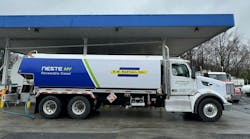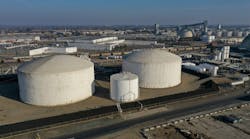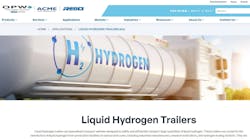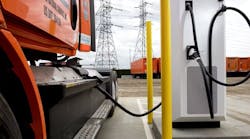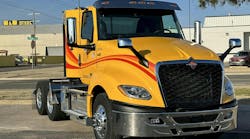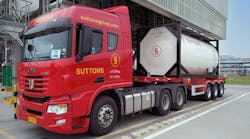With natural gas as a fuel for heavy-duty truck transportation gaining traction, ACT Research Co LLC has completed the last of a trilogy of reports on the emerging trend. The latest white paper is entitled: “TAKING THE NEXT STEP: Preparing the Maintenance Shop for the Arrival of Natural Gas Trucks”
With the increased natural gas focus, ACT thought it prudent to explore what the next step would be, which led to an investigation of the facilities needed to safely maintain and repair these vehicles.
According to Ken Vieth, ACT’s senior partner and general manager, “The adoption of natural gas in a heavy transportation fleet is a three-step process. First, you’ll need to determine whether natural gas fuel is right for your firm’s operation. Then, you’ll need to decide whether that will be in the form of CNG (compressed natural gas), LNG (liquefied natural gas) or both and the engine technology: spark or HPDI/dual fuel.”
He added that the third step is to “determine how the maintenance facilities should be modified or constructed to be compliant with applicable NG fuel codes, while upgrading diesel service capabilities at the same time.”
Natural gas acts differently than gasoline and diesel fuel when it escapes containment, therefore different precautions must be taken. Natural gas is lighter than air and will rise, while gasoline and diesel fuel are heavier than air and will stay on the ground. For this reason, maintenance facilities that have never been set up to handle natural gas fueled vehicles must be modified to bring them into code compliance. As part of this process, each company must decide whether its shop employees will perform minor or major repairs onsite. This influences the extent of the required changes. Another option is to have all repairs on the natural gas fleet done offsite where needed facilities and technicians already exist.
To understand what this all means, the ACT staff went on location with Indianapolis-based Monarch Beverage to explore how a private fleet converted to natural gas fuel and what the maintenance facility modifications include.
Vieth says: “The plan was initially to dwell solely on how Monarch made their maintenance facility natural gas compliant.” During the course of the research the information uncovered was so interesting and enlightening that ACT’s editorial staff decided to prepare a case study. The case study discusses natural gas as a transportation fuel for heavy duty trucks. It is entitled:
“A Private Fleet Natural Gas Case Study: Monarch Beverage’s Decision to Convert from Diesel to Natural Gas”
The Monarch Beverage Company case study discussion includes:
• what prompted Monarch to consider natural gas fuel
• the financials that made the consideration serious
• the process of adapting their maintenance facility
• how Monarch worked with their local fire marshal
• Monarch’s unique position, with their sister company EF Transit, as a shipper and a trucker
• what they learned and what they would do differently

